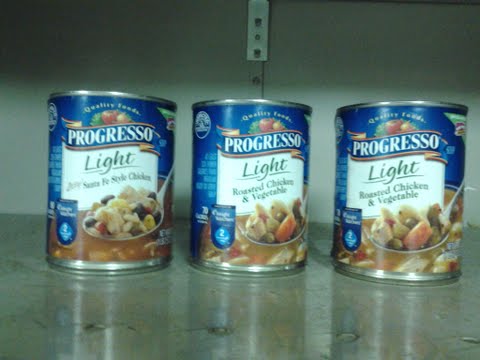Did You Know Progresso Soup Cans Are Lined With Bisphenol A ?

Progresso uses BPA in their cans
Did you think that Progresso soup was a healthy meal for lunch, supper or a snack? Well think again. Progresso soup is not as healthy as we thought it was. There is evidence and information which says the Progresso soup cans contain chemicals in the cans lining ,and have been linked to these health conditions: obesity, diabetes, heart disease and cancer.
Progresso uses bisphenol A, or BPA to line the soup cans. It has been long warned by scientist about the BPA's link to cancer, but new studies have found that it is related to such conditions as obesity and diabetes. Also according to a study, the BPA will basically tricks the fat cells into taking in more fat , and this can also trick the pancreas into producing more insulin than what is necessary, which could lead to Type 2 Diabetes.
Progresso uses dangerous levels of BPA in its soup cans, and there have been consumer reports on this issue.
There are samples that contained so much BPA that just eating one serving would mean you ingested 80 times more BPA than the experts say you should have in one day.
So what is this chemical Bisphenol A all about?
Bisphenol A
is an organic compound. It's a colorless solid, and is soluble in organic solvents, though it is poor in soluble water. This BPA is controversial, as it experts, detectable hormone like properties. Which raises concerns about the presence in the consumer products & food contained in these products. Back in 2008 the government has questioned it's safety. Which prompted some retailers to withdraw the polycarbonate products. Did you know that Bisphenol is used to make Plastics? And they have been is use since 1957. Did you also know? Bisphenol A is a precursor to the " Flame retardant tetr9mobisphenol A, and it was formerly used as a " fungicide". Not to mention Bisphenol A is preferred as a color developer for the carbonless copy paper and also thermal paper.
History:
Russian chemist Alekasandr Dianin discovered Bisphenol A in 1891. Then in the 1930s a British chemist named Charles Edweard Dodd had recognized the BPA as being an artificial estrogen. Can you imagine the fact that it was used to enhance the growth of cattle & poultry? And who knew that BPA was used back in the 1950s to harden polycarbonate plastics. Though it was tested back in the 30's in the labs involving rats. Though is was not until 1997 that adverse effects of the low dose exposure on the lab animals were proposed, and then modern studies started to find possible connections related to health issues that were caused by the exposure to BPA during pregnancy. The research is still an ongoing thing, and the debates continue regarding whether BPA should be banned, and if so to what extent, and this is not just here in the US, but all over the world. Canada's department of environment declared BPA in 2010 to be a very "toxic substance".
Effects On The Health:
The chemical Bisphenol A is supposed to be a weak endocrine disruptor, and is supposed to mimic estrogen and could very well lead to negative health effects. There have even been studies that have linked prenatal exposure to the later neurological difficulties. There was a study done in 2011, and after an investigation, they found that the number of chemicals that pregnant women are in just the US alone, was found to be 96%. So overall, the empirical evidence supported the negative effects of BPA, though opinions did vary greatly about the health effects from BPA. Also in 2008 a review had concluded obesity could have been increased as a function from BPA exposure. Also the National Institute Of Health had determined there was concern about the BPA's effect on the fetal and infant's brain development and also behavior. In 2008 the U.S. National Toxicology Program agreed with the panel, and also expressed some concern for the effects on the brain. The FDA in January 2010 also expressed a level of concern. There have been various other studies as well between 2005 to 2010, and these studies have included breast cancer, cancer, thyriod function, prostrate development and the reproductive system, there have been many other studies as well, actually to many to list.
My final thoughts: Why with all the studies over the years, and there have been so many, and just the amount of evidence that has been discovered in all these studies which prove BPA is a dangerous chemical and should not be used in many products, especially food packaging products, then why are companies still using BPA? It should be banned from usage in all food packaging products.
And given the fact that the Progresso soup company is aware of this danger, why do they continue to use BPA in their soup cans and put the public at risk? Progressave should follow the Campbell soup company , they agreed to stop using BPA in their cans after there was a public outcry, in which more than 20,000 people signed a petition to have Campbells stop using BPA. So if Campbells can do it, than so can Progresso.







